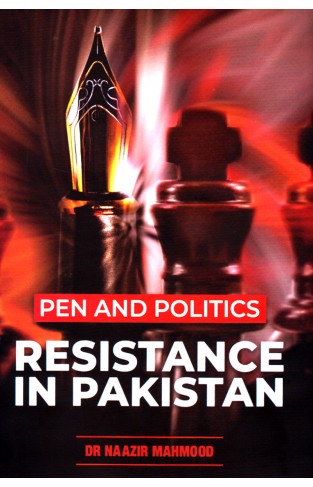PEN AND POLITICS RESISTANCE IN PAKISTAN
By: Dr. Nazir Mahmood
-
Rs 1,621.75
- Rs 2,495.00
- 35%
You save Rs 873.25.
Due to constant currency fluctuation, prices are subject to change with or without notice.
This impressive collection of short essays by Dr. Naazir Mahmood centers upon the theme of resistance to hegemonic domination. What resistance means, of course, depends upon the particular context. His canvas is super-sized, spanning continents and drawing examples as different as the Bhakti movement in India to the birth of Protestantism in Europe. But most of the book deals with forms of resistance on the Indian subcontinent about which, quite naturally, the author has the most to say and in some cases has intimate knowledge of.
By excerpting particularly poignant parts of Urdu novels and short stories, the author brings before us the wealth of Urdu literature -both prose and poetry - created under the shadow of military rule. This deals with how West Pakistanis sneered at and trod upon Bengalis, the plight of Biharis who had fought for Pakistan but were abandoned, the resistance literature that Zia-ul-Haq's oppression gave birth to, how the Baloch have struggled for their rights under different governments, and so much more. There are well-deserved eulogies to those Pakistanis who have stood up to the powers-that-be and refused the ideological straitjacket. Among them are Aslam Azhar, Fahmida Riaz, Kishwar Naheed, and Sobho Gianchandani. The author's impressive breadth of reading and familiarity with left-wing politics is most evident here and therefore, in my opinion, this is perhaps the strongest part of this book.
To question received wisdom is not in our culture or habit. But the author is unusual in having been born into a family that was different. A passion for reading and interactions with people from different parts of Pakistan has made the author different from most. Not everyone will be comfortable with his views. Some will question the author's patriotism but he knows how to answer them: patriotism is a farce if it does not involve loving all people, including the disabled, the transgender, and the other marginalized peoples. Patriotism cannot be built on hating others.
This impressive collection of short essays by Dr. Naazir Mahmood centers upon the theme of resistance to hegemonic domination. What resistance means, of course, depends upon the particular context. His canvas is super-sized, spanning continents and drawing examples as different as the Bhakti movement in India to the birth of Protestantism in Europe. But most of the book deals with forms of resistance on the Indian subcontinent about which, quite naturally, the author has the most to say and in some cases has intimate knowledge of.
By excerpting particularly poignant parts of Urdu novels and short stories, the author brings before us the wealth of Urdu literature -both prose and poetry - created under the shadow of military rule. This deals with how West Pakistanis sneered at and trod upon Bengalis, the plight of Biharis who had fought for Pakistan but were abandoned, the resistance literature that Zia-ul-Haq's oppression gave birth to, how the Baloch have struggled for their rights under different governments, and so much more. There are well-deserved eulogies to those Pakistanis who have stood up to the powers-that-be and refused the ideological straitjacket. Among them are Aslam Azhar, Fahmida Riaz, Kishwar Naheed, and Sobho Gianchandani. The author's impressive breadth of reading and familiarity with left-wing politics is most evident here and therefore, in my opinion, this is perhaps the strongest part of this book.
To question received wisdom is not in our culture or habit. But the author is unusual in having been born into a family that was different. A passion for reading and interactions with people from different parts of Pakistan has made the author different from most. Not everyone will be comfortable with his views. Some will question the author's patriotism but he knows how to answer them: patriotism is a farce if it does not involve loving all people, including the disabled, the transgender, and the other marginalized peoples. Patriotism cannot be built on hating others.
PEN AND POLITICS RESISTANCE IN PAKISTAN
By: Dr. Nazir Mahmood
Rs 1,621.75 Rs 2,495.00 Ex Tax :Rs 1,621.75
Zubin Mehta: A Musical Journey (An Authorized Biography)
By: VOID - Bakhtiar K. Dadabhoy
Rs 472.50 Rs 1,050.00 Ex Tax :Rs 472.50
Back To Work: Why We Need Smart Government For A Strong Economy
By: President Bill Clinton
Rs 1,615.50 Rs 1,795.00 Ex Tax :Rs 1,615.50
The Origins of Political Order From Prehuman Times to the French RevolutioN
By: Francis Fukuyama
Rs 3,505.50 Rs 3,895.00 Ex Tax :Rs 3,505.50
Manning Up: How the Rise of Women Has Turned Men into Boys
By: Kay Hymowitz
Rs 646.75 Rs 995.00 Ex Tax :Rs 646.75
The Obama Syndrome: Surrender At Home War Abroad
By: Tariq Ali
Rs 1,165.50 Rs 1,295.00 Ex Tax :Rs 1,165.50
The Quest For Meaning: Developing A Philosophy Of Pluralism
By: Tariq Ramadan
Rs 1,255.50 Rs 1,395.00 Ex Tax :Rs 1,255.50
The Pakistan US Conundrum Jihadists The Military And The People The Struggle For Control
By: Yunas Samad
Rs 1,255.50 Rs 1,395.00 Ex Tax :Rs 1,255.50
An Enemy We Created: The Myth Of The Taliban Al Qaeda Merger In Afghanistan 19702010
By: Alex Strick van Linschoten
Rs 3,412.50 Rs 5,250.00 Ex Tax :Rs 3,412.50
WikiLeaks: Inside Julian Assanges War on Secrecy
By: David Leigh & Luke Harding
Rs 552.50 Rs 850.00 Ex Tax :Rs 552.50
Back To Work: Why We Need Smart Government For A Strong Economy
By: President Bill Clinton
Rs 1,615.50 Rs 1,795.00 Ex Tax :Rs 1,615.50
No recently viewed books available at the moment.
Zubin Mehta: A Musical Journey (An Authorized Biography)
By: VOID - Bakhtiar K. Dadabhoy
Rs 472.50 Rs 1,050.00 Ex Tax :Rs 472.50
PEN AND POLITICS RESISTANCE IN PAKISTAN
By: Dr. Nazir Mahmood
Rs 1,621.75 Rs 2,495.00 Ex Tax :Rs 1,621.75
Back To Work: Why We Need Smart Government For A Strong Economy
By: President Bill Clinton
Rs 1,615.50 Rs 1,795.00 Ex Tax :Rs 1,615.50














-120x187.jpg?q6)






-120x187.jpg?q6)



-120x187.jpg?q6)



